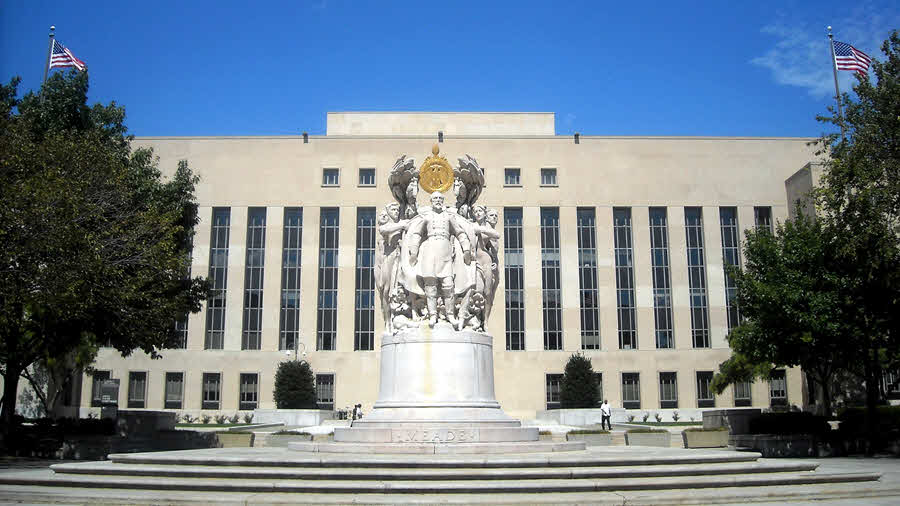Court Vacates FCC Dereg of Cell Tower-Site Reviews

The smarter way to stay on top of broadcasting and cable industry. Sign up below
You are now subscribed
Your newsletter sign-up was successful
Turns out the race to 5G can't run roughshod over the landscape, at least as the FCC has proposed it.
In a partial defeat for the FCC and a victory for localities trying to retain their authority over cell tower placement and impact, a federal appeals court has ruled that the FCC did not justify its deregulation of small cell site historic and environmental reviews and has vacated that part of a larger wireless deployment deregulation order.
Related: Carr Says Tower Siting Dereg Already Paying Off
Over the objections of local government officials and the reservations of Democratic commissioner Jessica Rosenworcel, the FCC voted last September to streamline the path to small cell deployment, including the part on site reviews, billing it as crucial to the rollout of 5G wireless service, an FCC and Trump Administration priority.
The FCC argued that such reviews were not statutorily required, would impede the rollout of 5G networks, and that their costs outweighed any benefit. But as with many FCC decisions, opponents went to court.
That court, the U.S. Court of Appeals for the D.C. Circuit*, said it did not buy the FCC's argument that such reviews "pose little to no cognizable religious, cultural, or environmental risk," in particular given "the vast number of proposed deployments and the reality that the Order will principally affect small cells that require new construction," the court said.
The court found that the FCC did not adequately address the potential harms of deregulation or the benefits of environmental and historic-preservation reviews, particularly for Indian lands that "may include Tribal burial grounds, land vistas, and other sites that Tribal Nations...regard as sacred or otherwise culturally significant."
The smarter way to stay on top of broadcasting and cable industry. Sign up below
For that reason, the court said, the FCC's regulatory order on small cells is arbitrary and capricious. (It did not vacate the changes the FCC made to tribe's participation in the reviews).
The court vacated that part of the order and remanded it back to the FCC, which could try to better justify it.
The United Keetoowah Band of Cherokee Indians in Oklahoma and supporting intervenors had challenged the order.
"This confirms that the FCC cannot just scream "5G" to justify ignoring its duties to Tribal Nations and to the environment," said Andrew Jay Schwartzman, Georgetown University Law Center, a lawyer who represented the challengers. "The decision does give the FCC more latitude than we would prefer on some of the mechanisms for tribal review, but we will deal with that on the remand."
A spokesperson for FCC chair Ajit Pai had not response, referring the call to commissioner Brendan Carr, who championed the tower citing deregulatory item.
Carr suggested the legal glass was still mostly full.
“This FCC has been focused on cutting red tape so that all Americans, regardless of where they live, can have access to fast, affordable connections, including through our world-leading 5G," he said. "Combined, the FCC’s actions have enabled the U.S. to leapfrog our global competitors and secure the largest 5G build in the world.
“I am pleased that the court upheld key provisions of last March’s infrastructure decision. Most importantly, the court affirmed our decision that parties cannot demand upfront fees before reviewing any cell sites, large or small. These fees, which had grown exponentially in the last few years, created incentives for frivolous reviews unrelated to any potential impact on historic sites. Those financial incentives are gone, and we expect our fee restrictions to continue greatly diminishing unnecessary and costly delays. I’m also pleased that the court affirmed our accelerated timelines for reviews. Already, these reforms have resulted in significant new builds."
“We are reviewing the portion of last March’s decision that the D.C. Circuit did not affirm and look forward to next steps, as appropriate."
Commissioner Jessica Rosenworcel saw it a bit differently.
“The court just vacated a large part of the FCC’s 5G deployment strategy,"" she said. "For those paying attention, that means the agency tasked with the future of connectivity didn’t get it right. It’s time to go back to the drawing board and do better.”
"The FCC has rightfully sought to modernize outdated siting rules to accelerate the deployment of 5G technologies, and it’s been working," said Tom Power, SVP and general counsel for CTIA, which weighed in with the court in support of the FCC. "These reforms are pushing America ahead in the global 5G race and are critical to maintaining our wireless leadership. We are pleased that the court affirmed some of these steps today, particularly with respect to fees and deadlines for siting reviews. The court’s decision also underscores the need for further legislative, judicial and regulatory action to remove barriers to deployment."
*Editor's note: The court decision likely got more immediate and wider attention than it might otherwise as reporters watched the D.C. court side for another FCC decision--net neutrality, which did not come out Friday.
Contributing editor John Eggerton has been an editor and/or writer on media regulation, legislation and policy for over four decades, including covering the FCC, FTC, Congress, the major media trade associations, and the federal courts. In addition to Multichannel News and Broadcasting + Cable, his work has appeared in Radio World, TV Technology, TV Fax, This Week in Consumer Electronics, Variety and the Encyclopedia Britannica.

